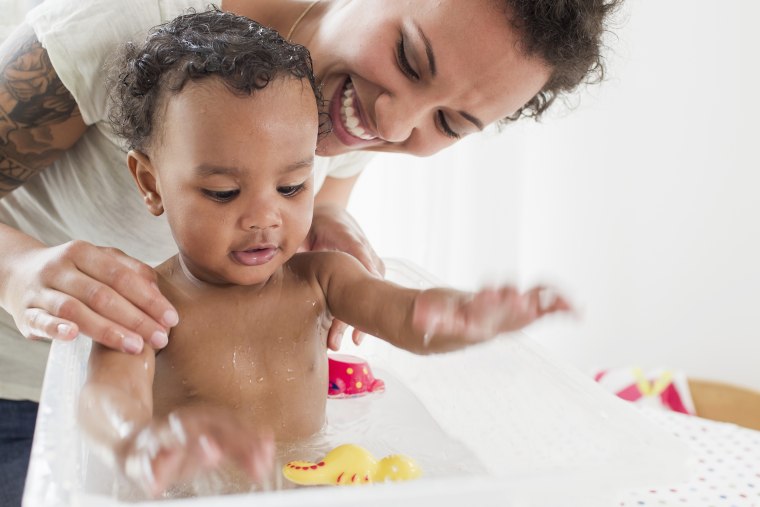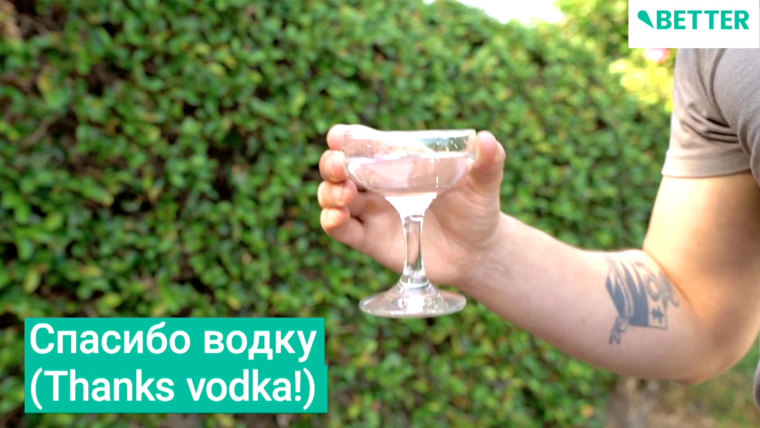Should Parents Clean Baby Teething Toys Before Babies Are Allowed to Use Them
How and when to clean everything in your baby's nursery
A new study found that common baby items are dirtier than a pet's h2o basin. Here'due south how to keep the biggest offenders clean.

Infants and toddlers, so wonderful and ambrosial, are alas, total magnets for germs. They touch everything. They put their hands in their mouths (and other things) then they touch everything again. Of course they can't notwithstanding main skilful paw hygiene on their own, so parents and caretakers are always on high alert, constantly cleaning up, wiping down and doing any else they can to minimize their babies' chances of encountering infectious leaner.
Merely when yous're juggling children and other family and likely work — it's really challenging to manage your baby's hygiene forth with virtually everything they come into contact with. There's only and then much you tin do; and that'south okay, considering kids are going to be exposed to germs no matter how pristine your household.
Germ exposure will happen anyway, but nosotros can take precautions to minimize
"We're not raising our children in bubbling," says Dr. Shari Platt, primary of pediatric emergency medicine at New York-Presbyterian/Weill Cornell Medical Center tells NBC News Better. "A child will be exposed to bacteria when they're in the outside world (and I'm a strong believer of getting your kid outdoors and to experience other children). If they take healthy allowed systems they should exist able to fight average exposure."
Yet, Dr. Platt emphasizes, it's important to keep everything as make clean equally you tin can to minimize unnecessary exposure to bacteria, which could prompt infection (though Platt says it's almost impossible to determine when infections are the direct result of contact with everyday germs).
Here'southward a list of the items y'all should be focusing on along with expert tips on how and when to clean them.
Bath toys and safe toys
A new report by InsuranceQuotes.com tested (using gram and stain civilization swab tests) common baby items (a bath toy, a teething toy, a stroller handle and a public diaper irresolute station) to acquire what tended to be the germiest. Bathroom toys blew everything else out of the h2o, containing over four.3 million colony-forming units (CFU) per square inch.
Bath toys blew everything else out of the h2o, containing over 4.3 one thousand thousand colony-forming units (CFU) per square inch.
"Germs likely aren't top of mind at bath time, for example, but bath toys are 10 times dirtier than a pet'southward water basin and contain the highest rate of gram-negative rods which are extremely harmful to humans," says Mel Kasulis, project manager for insuranceQuotes.com "Bath toys comprise 86 percentage gram-negative leaner and fourteen percent gram-positive."
"At the terminate of each bath fourth dimension, we recommend soaking all your child'due south bath toys in a tub of warm water and mild liquid dish soap for several minutes, then rinse well with cool water," says Debra Johnson, Merry Maids home cleaning expert. "Once dry, shop them in a handbasket or storage bin outside of the bathroom."
Teething toys
"Since these are constantly in your babe's mouth, we like to take an actress step when cleaning these," says Johnson. "First, soak in a bowl of hot h2o and balmy liquid dish detergent for a few minutes. Then, in another tub or bowl, mix together distilled white vinegar and warm h2o and soak the teething toys for 15 minutes before rinsing make clean with cool h2o."
Sippy cups
Also in and out of our kids' mouths all day, sippy cups should be cleaned with care.
"Place spout and valve in a container or bowl total of baking soda, leave overnight," says Johnson. "In the forenoon, soak all pieces in equal parts distilled white vinegar and water for up to 12 hours. Use a canteen brush to scrub the cup/top and rinse to make sure you got it all."
Wooden toys
Johnson'southward underscored pro-tip for wooden toys: Do not soak or submerge them in water. Wood is porous and that water assimilation can potentially harvest mold.
Exercise not soak or submerge [forest toys] in water. Wood is porous and that water assimilation tin potentially harvest mold.
Hither's what Johnson suggests:
"Prepare a solution of l percentage white vinegar and 50 percent h2o in a spray bottle. Spray blocks with the solution. Wipe blocks with a dry microfiber cloth. If a spray bottle is non available, mix vinegar and water in a basin. So immerse a microfiber material in the vinegar/water solution, wring out the microfiber cloth, and wipe the wooden blocks."
Plush toys
"Y'all should make clean blimp animals and more plush toys weekly or when it is visibly muddied or stained," says Johnson. "It'south too smart to wash these when the baby has been sick to end the spread of germs. We recommend placing stuffed animals in a pillowcase should parts come up off during wash, and launder in the washing machine according to instructions on the tag. If there are none, it's standard to launder in hot water and tumble dry on depression."
Nosotros apologize, this video has expired.

Mattress and Bedding
"Bedding should be cleaned every week, or more often should the need ascend (overflow of diaper if your fiddling sneaks into bed)," says Johnson. "First, vacuum both sides of the mattress and underneath it to scoop up any loose debris. If the infant's mattress is waterproof, but wipe downward with a baby wipe. If information technology isn't waterproof, mix ¼ cup hydrogen peroxide, ¾ cup water, and ½ tsp. dish soap. Dip a microfiber cloth into the solution and wipe downwardly the mattress. Launder all sheets and blankets."
You should likewise accept precautions to guard against allergens in the bedding.
"But equally in any room of the house, the number of allergens that can build up in your kid's sleeping accommodation are tremendous, all the same they can be managed," says Richard Ciresi, franchise owner of Aire Serv, a Neighborly Company. "In order to protect the place where they rest their heads every night, encase their pillows and mattress in a sealed tight grit-mite-proof cover. This will preclude build upward. Brand sure to wash their sheets at least once a calendar week."
Stroller handles
InsuranceQuote's study constitute that the average stroller handles contain 1,418,818 CFU, ranking them third germiest of the four objects tested.
"Typically, stroller handles are fabricated of foam, which makes cleaning them easy," says Leanne Stapf, VP of operations at The Cleaning Authority. "Lather up a dish rag with warm soapy water and wipe down the handle. You will need to exercise this frequently, as strollers can be subject to a lot of exterior germs. If you desire to eliminate this step, many manufactures now offering washable grip covers."
On the go? Johnson suggests baby wipes for a quick scrub down.
Surprisingly, public diaper changing stations were the least germy of the 4 objects tested.
Diaper changing expanse
Surprisingly, public diaper irresolute stations were the least germy of the four objects tested in the written report (perhaps because we're already vigilantly wiping them down). Proceed upward the addiction, and make clean these with antibacterial wipes per Dr. Platt's recommendation, before and after use.
Diaper bins
You'll also desire to keep those diaper bins in peak aseptic status.
"Diapers are a breeding ground for bacteria and when the diaper bins start looking like Mount Everest, information technology's time for a deep clean to keep the germs at bay," says Stapf. "Have your diaper bin outside and spray it down with a hose. Scrub the pail with warm soapy water or use water and a half cup of Borax."
To help eliminate whatever lingering odors, Johnson recommends the following: "Mix together a DIY solution of two cups h2o to forty drops lavender essential oil for antibacterial properties — and to mask the odor of those yucky diapers. Each time a new bag is placed in the bin, sprinkle baking soda in the bag. If you have an extra stinky diaper, sprinkle a tad more baking soda later on dropping it in the bin."
Always be prepped with wipes and ban the 'five-2d rule'
Dr. Platt strongly recommends keeping antibacterial wipes on you lot at all times, adding that you should use these to wipe downward any area your child may come into contact with while traveling. For convertible car seats, Johnson suggests babe wipes or a spray bottle filled with a combination of water and distilled white vinegar. Keep this and a microfiber cloth to wipe in the automobile and you lot're good to go.
Another quick tip from Dr. Platt: "The v-second rule does not apply to children. If they drop something on the floor, launder it immediately. I'd also like to dispel the myth that our spit cleans annihilation. Loving and nurturing equally a parent's mouth may be, information technology is, like all mouths, filled with bacteria."
MORE SPRING CLEANING TIPS
- How often you should clean your home, according to science
- The all-time spring cleaning products, according to the pros
- Why the 20/10 method can alter the way you lot make clean
- How oft to replace everything in your bath, bedroom and kitchen
Desire more than tips like these? NBC News BETTER is obsessed with finding easier, healthier and smarter ways to alive. Sign upward for our newsletter and follow us on Facebook, Twitter and Instagram.
bullardsymaine1985.blogspot.com
Source: https://www.nbcnews.com/better/health/how-when-clean-everything-your-baby-s-nursery-ncna896596
0 Response to "Should Parents Clean Baby Teething Toys Before Babies Are Allowed to Use Them"
แสดงความคิดเห็น